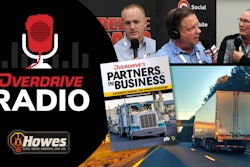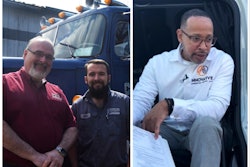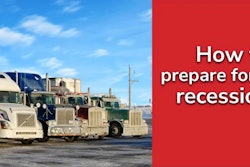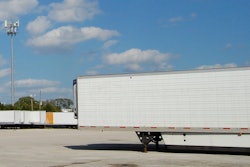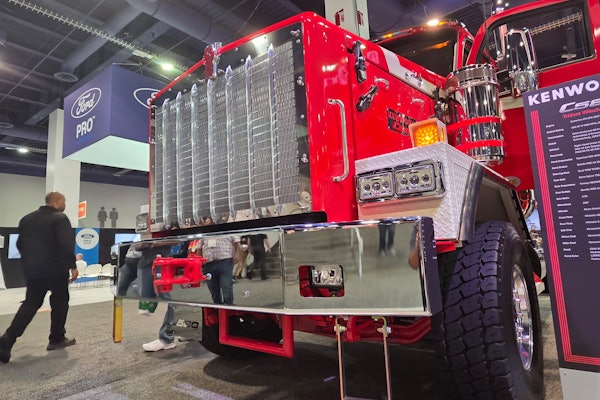Truckers "are in the customer service business," noted Gary Buchs in part of a conversation with Eric Harley of Red Eye Radio at the 2023 Mid-America Trucking Show.
Seems simple, right? Serve the customer. Yet that can take many forms, whether through on-time performance, covering of new lanes through a contract or something else. This portion of the hour-long roundtable touched on current freight-market difficulties and the various tactics owner-operators can take to strengthen relationships with all their freight partners, from brokers and carriers to shippers and receivers -- those potential future direct customers.
One way to gain a customer for life? As noted Overdrive Editor Todd Dills, ask whoever it is that feeds you freight just what is their single-most difficult load to cover. "Chances are, you can cover that," he said. If you do, you've got a partner for life.
This video excerpts Red Eye Radio's Harley's roundtable discussion at MATS with owner-op business coach and Overdrive contributor Buchs, ATBS Vice President Mike Hosted, and Dills about owner-operator business evolution and practice on the occasion of the release of updates in the Partners in Business Overdrive/ATBS coproduction.

Catch more in the video. The full talk can be heard via Red Eye Radio's "Extra Mile" podcast or via the Overdrive Radio podcast at this link Find brief excerpts from the talk in the eight-video playlist below.
Owners looking for additional business tips, among a myriad of other topics, can find more in the Overdrive/ATBS-coproduced "Partners in Business" manual for new and established owner-operators, a comprehensive guide to running a small trucking business. Click here to download the updated 2023 edition of the book free of charge.
Gary Buchs: Who have you hauled for repeatedly? Are you contacting them? "Well, no." I go, "Why not? Why aren't you contacting the people you've worked with?"
Eric Harley: Okay, let's stop and talk to that owner operator. Because it was last summer, I was at the Walcott Trucker's Jamboree, and I walked on up on a driver that I know, Tony Snow, and he had just booked a load and was worried about fuel prices, because he was trying to factor everything in. He just got off the phone as I was walking up to him, "Man, I was trying to book a load, and with fuel prices", and he's trying to work everything out there. I felt so helpless for him, but I could see that he was like, "All right, man, it's tough booking that." So if you're talking to an owner operator in these lean times of booking that load, you started with something. Those relationships you've built already, those are people that trust you, they've worked with you before, you have somewhat of a reputation with them. What else would you add to that? Where do they go next? What do they need to do in terms of finding those loads, finding that freight in those lean times?
Gary Buchs: It begins with best practices on customer service. We are in the customer service business. We're not in the driving business, we're not in the driving fast business. We are in it to make a profit, a return for our families. So when we go into a customer, don't be the problem, be the solution to their problem, help them recognize that. When they have other truckers there that are causing trouble, when you get a chance to check in, say, "Look, it looks like you're having a rough day. Let me know how I can help you."
Eric Harley: That's a great way to start. Right there, a great phrase to use. How can I help you?
Gary Buchs: Here's another thing. Never ever mention to a customer, "Hey, can you hurry up? I got to get to another customer." They will slow down on you. They aren't worried about your next customer, they want you to be worried about them. You never mention your next load. I've had them say, I'll be in the waiting room, and they'll go grumbling about waiting, and the clerk could hear us, and I said, "Well, I'm not really worried. I'm getting a hundred dollars an hour to sit here." The clerk would go like that. 15 minutes later, they'd have me in a door out of there because they didn't want me to get a hundred dollars an hour.
Now, whether I got a hundred or not, they didn't know, but I knew how to work the system. But I often did get a hundred dollars an hour. Being an owner, I negotiated that ahead of time. That's the thing. All these things factor in. You price your whole day on the load, you don't just price the mile, because you don't know what's going to happen after that. You may have to sit the rest of the day, you've got to pay for the whole day.
But we come back to some of those basics of when you're looking for a load, building, put your name, print your name, and put your cell phone number on your bills of lading. Point it out to the customer and say, "Hey, if I pull out of the dock and there's a problem or a question, you call me directly." I've been in the parking lot, had them call and say, "We forgot a pallet. Where are you?" I said, "Well, I'm right outside." "Oh my gosh." It was maybe 30 minutes, but I was still getting ready to go. If we wouldn't have still been there, if they wouldn't have had my number, they would've had to get an expedite, it would've cost them thousands of dollars to complete that load. I mean, those little things, they remember.
Todd Dills: That whole conversation there you guys were having made me think of another icebreaker for guys that have contacts with logistics managers or brokers. Logistics management shippers, I mean, or brokers, this can work too. But this is one from owner-operator, Henry Albert, who I think most people in here probably know.
Eric Harley: Yeah, yeah.
Todd Dills: He and I go back a long ways, but back in probably around the time I met him in 2007, he said, and I actually did this, but I always tell this to somebody, "If you want to go after a direct customer", or you can do this with your broker as well, "just ask them what their toughest load to cover is. Ask them what nobody in their right mind ever wants to do for them, and there's a chance that you can. And if you can, you're going to have that guy for life." That's just one little thing that came to mind when I was thinking about it.
Eric Harley: Yeah, but I love that. And having talked to Henry so many times over the years, that is truly a Henry Albert approach.
Todd Dills: And that's service, right?
Eric Harley: Yeah, that's it. Because one thing that I hear from drivers, and I know Todd, Mike, Gary, you've all heard it, and from drivers, we get that feedback, we're kind of the sounding board a lot, but it's, "I want to be treated as a person, not a number." I think if we take that on then we have to have that practice in how we treat others.
Todd Dills: Oh yeah, definitely.
Eric Harley: That there's somebody there, and they're struggling, and maybe they're impatient because something's going on there, but if we can offer that solution, if we can be the solution, it's like you said, Todd, we're friends for life, right? Once you do that, then they're going to be thinking of you in that way and they're going to look to you for that solution.
Mike Hosted: Yeah, and that's what I think, and how I'm going to teach my kids, is you have to be the bigger person in every instance. You think about driving. You're stuck in traffic, you're getting cut off by cars constantly. It takes you all day to get to somewhere that should have taken you half the day. You get to the shipper and there's not enough staff there in the post pandemic world, so you're sitting there waiting for staff to unload you. Not only that, but they won't let you in to use the bathroom, right? So there's so many trigger points along the way, where it's like, "I am being treated terribly", but you have to be the bigger person and deliver that customer service like we've been talking about.
Eric Harley: Right.
Mike Hosted: Because you've been beat up the whole way, but you still have to be the bigger person.
Eric Harley: Yeah, and I think we could put Gary and we could put Henry Albert in this category of those guys that, man, those guys are, "Oh, he'll do anything for you. That guy's a lovely guy, man. He's always got a great attitude." If your customer is thinking of you that way, you're at the top of their list every day, all day. That's what it's all about.
